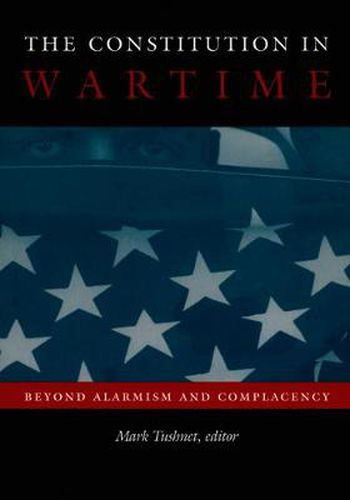Readings Newsletter
Become a Readings Member to make your shopping experience even easier.
Sign in or sign up for free!
You’re not far away from qualifying for FREE standard shipping within Australia
You’ve qualified for FREE standard shipping within Australia
The cart is loading…






Most recent discussion of the United States Constitution and war–both the war on terrorism and the war with Iraq–has been dominated by the alarmism of those who see portents of gross restrictions on American civil liberties in many current policies and the complacency of those who see restrictions on civil liberties as entirely reasonable accommodations to the new realities of national security. Whatever their contributions to the public discussion and policy-making processes, these voices contribute little to the understanding of the real constitutional issues raised by war. Providing the historical and legal context needed to assess competing claims, The Constitution in Wartime identifies and explains the complexities of the important constitutional issues brought to the fore by wartime actions and policies. Twelve prominent legal scholars and political scientists combine broad overviews of U.S. history and contemporary policy with detailed yet accessible analyses of legal issues of pressing concern today. Some of the essays are broad in scope, reflecting on national character, patriotism, and political theory; exploring whether war and republican government are compatible; and considering in what sense we can be said to be in wartime circumstances today. Others are more specific, examining the roles of Congress, the presidency, the courts, and the international legal community. Throughout the collection, balanced, unbiased analysis leads to some surprising conclusions, one of which is that wartime conditions have sometimes increased, rather than curtailed, civil rights and civil liberties. For instance, during the cold war, government officials regarded measures aimed at improving America’s image abroad by expanding African Americans’ freedom at home as crucial to U.S. struggles against the Soviet Union. Contributors Sotirios Barber Mark Brandon James E. Fleming Mark Graber Samuel Issacharoff David Luban Richard H. Pildes Eric Posner Peter Spiro William Michael Treanor Mark Tushnet Adrian Vermeule
$9.00 standard shipping within Australia
FREE standard shipping within Australia for orders over $100.00
Express & International shipping calculated at checkout
Most recent discussion of the United States Constitution and war–both the war on terrorism and the war with Iraq–has been dominated by the alarmism of those who see portents of gross restrictions on American civil liberties in many current policies and the complacency of those who see restrictions on civil liberties as entirely reasonable accommodations to the new realities of national security. Whatever their contributions to the public discussion and policy-making processes, these voices contribute little to the understanding of the real constitutional issues raised by war. Providing the historical and legal context needed to assess competing claims, The Constitution in Wartime identifies and explains the complexities of the important constitutional issues brought to the fore by wartime actions and policies. Twelve prominent legal scholars and political scientists combine broad overviews of U.S. history and contemporary policy with detailed yet accessible analyses of legal issues of pressing concern today. Some of the essays are broad in scope, reflecting on national character, patriotism, and political theory; exploring whether war and republican government are compatible; and considering in what sense we can be said to be in wartime circumstances today. Others are more specific, examining the roles of Congress, the presidency, the courts, and the international legal community. Throughout the collection, balanced, unbiased analysis leads to some surprising conclusions, one of which is that wartime conditions have sometimes increased, rather than curtailed, civil rights and civil liberties. For instance, during the cold war, government officials regarded measures aimed at improving America’s image abroad by expanding African Americans’ freedom at home as crucial to U.S. struggles against the Soviet Union. Contributors Sotirios Barber Mark Brandon James E. Fleming Mark Graber Samuel Issacharoff David Luban Richard H. Pildes Eric Posner Peter Spiro William Michael Treanor Mark Tushnet Adrian Vermeule